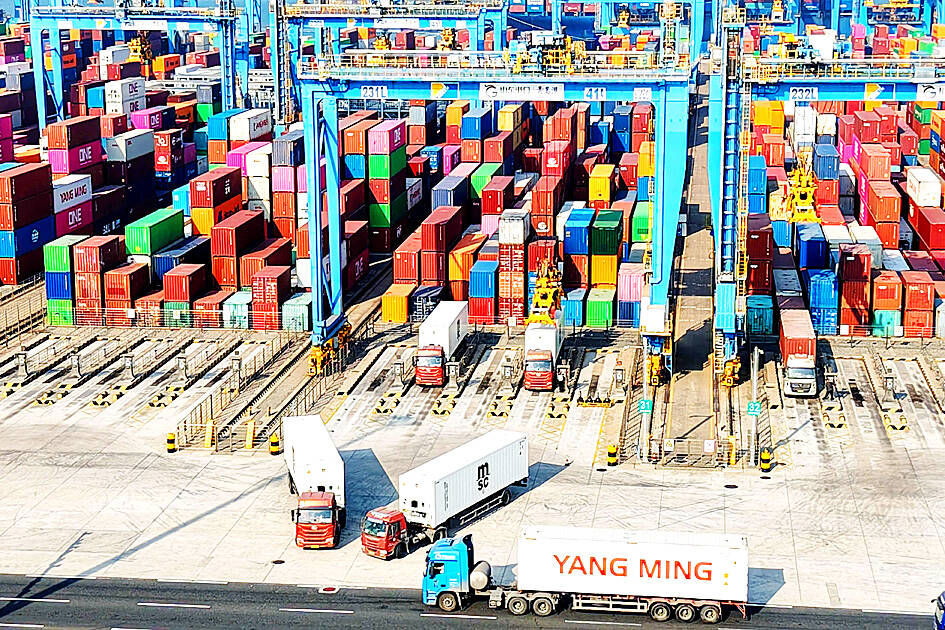China’s exports surged to a record high last year, providing a much-needed boost for the economy as the prospect of biting tariffs imposed by US president-elect Donald Trump looms.
“In 2024, China’s total exports exceeded 25 trillion yuan [US$3.41 trillion] for the first time, reaching 25.45 trillion yuan, an increase of 7.1 percent year-on-year,” Chinese General Administration of Customs spokesman Lu Daliang (呂大良) told a news conference in Beijing yesterday.
Total imports rose 2.3 percent to 18.39 trillion yuan, Lu added.

Photo: AFP
Combined trade expanded 5 percent to reach a record 43.85 trillion yuan, customs Vice Minister Wang Lingjun (王令浚) said.
“China’s position as the world’s largest goods trading nation has become even more secure,” Wang added.
Official customs data showed that exports last month jumped 10.7 percent year-on-year, comfortably outperforming a forecast of 7.5 percent in a Bloomberg survey of economists.
“We expect shipments to remain strong in the coming months, as US importers continue to stockpile Chinese goods ahead of tariff hikes,” Capital Economics Ltd economist Huang Zichun (黃子春) wrote in a note.
“But exports are likely to weaken later this year, as President Trump puts his tariff threats into action,” she added.
Imports last month grew 1 percent year-on-year, customs data showed, compared with a Bloomberg forecast of a 1 percent fall.
China’s exports “are likely to stay resilient in the near term,” Huang wrote.
“But outbound shipments will weaken later this year if Trump follows through,” she wrote, adding that the new US tariffs “could reduce export volumes by about three percent and shave roughly 0.5 percent off China’s GDP.”
During his presidential campaign, Trump threatened to slap a 60 percent tariff on all Chinese goods.
“With the help of strong exports and macro policy easing, the economic momentum likely stabilized,” Pinpoint Asset Management Ltd chief economist Zhang Zhiwei (張智威) wrote in a note yesterday following the publication of the trade figures.
The government is due to release last year’s economic growth data later this week. Chinese President Xi Jinping (習近平) on Dec. 31 expressed confidence that the country would meet its official economic growth target for last year of about 5 percent.

TECH TITAN: Pandemic-era demand for semiconductors turbocharged the nation’s GDP per capita to surpass South Korea’s, but it still remains half that of Singapore Taiwan is set to surpass South Korea this year in terms of wealth for the first time in more than two decades, marking a shift in Asia’s economic ranks made possible by the ascent of Taiwan Semiconductor Manufacturing Co (TSMC, 台積電). According to the latest forecasts released on Thursday by the central bank, Taiwan’s GDP is expected to expand 4.55 percent this year, a further upward revision from the 4.45 percent estimate made by the statistics bureau last month. The growth trajectory puts Taiwan on track to exceed South Korea’s GDP per capita — a key measure of living standards — a

Samsung Electronics Co shares jumped 4.47 percent yesterday after reports it has won approval from Nvidia Corp for the use of advanced high-bandwidth memory (HBM) chips, which marks a breakthrough for the South Korean technology leader. The stock closed at 83,500 won in Seoul, the highest since July 31 last year. Yesterday’s gain comes after local media, including the Korea Economic Daily, reported that Samsung’s 12-layer HBM3E product recently passed Nvidia’s qualification tests. That clears the components for use in the artificial intelligence (AI) accelerators essential to the training of AI models from ChatGPT to DeepSeek (深度求索), and finally allows Samsung

Taiwan has imposed restrictions on the export of chips to South Africa over national security concerns, taking the unusual step of using its dominance of chip markets to pressure a country that is closely allied with China. Taiwan requires preapproval for the bulk of chips sold to the African nation, the International Trade Administration said in a statement. The decision emerged after Pretoria tried to downgrade Taipei’s representative office and force its move to Johannesburg from Pretoria, the Ministry of Foreign Affairs has said. The move reflects Taiwan’s economic clout and a growing frustration with getting sidelined by Beijing in the diplomatic community. Taiwan

READY TO HELP: Should TSMC require assistance, the government would fully cooperate in helping to speed up the establishment of the Chiayi plant, an official said Taiwan Semiconductor Manufacturing Co (TSMC, 台積電) yesterday said its investment plans in Taiwan are “unchanged” amid speculation that the chipmaker might have suspended construction work on its second chip packaging plant in Chiayi County and plans to move equipment arranged for the plant to the US. The Chinese-language Economic Daily News reported earlier yesterday that TSMC had halted the construction of the chip packaging plant, which was scheduled to be completed next year and begin mass production in 2028. TSMC did not directly address whether construction of the plant had halted, but said its investment plans in Taiwan remain “unchanged.” The chipmaker started